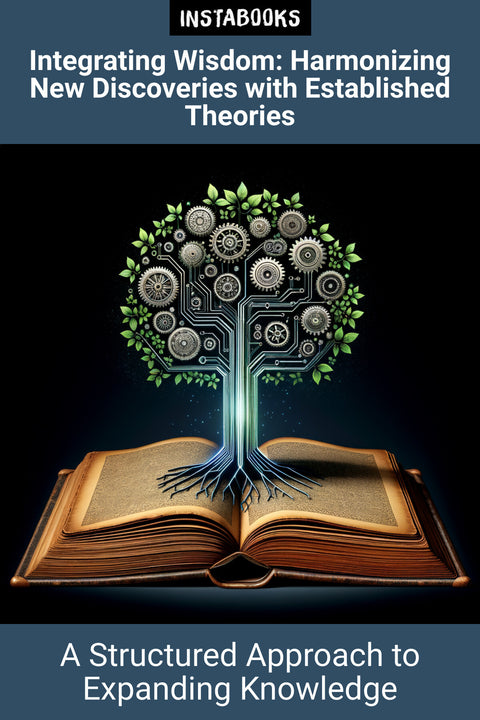
Integrating Wisdom: Harmonizing New Discoveries with Established Theories
A Structured Approach to Expanding Knowledge
Included:
✓ 200+ Page AI-Generated Book
✓ ePub eBook File — read on Kindle & Apple Books
✓ PDF Print File (Easy Printing)
✓ Word DOCX File (Easy Editing)
✓ Hi-Res Print-Ready Book Cover (No Logo Watermark)
✓ Full Commercial Use Rights — keep 100% of royalties
✓ Publish under your own Author Name
✓ Sell on Amazon KDP, IngramSpark, Lulu, Blurb & Gumroad to millions of readers worldwide
$149.00
$299.00
Title
Integrating Wisdom: Harmonizing New Discoveries with Established Theories offers readers a systematic process for absorbing and applying new information into pre-existing knowledge frameworks. It provides clear, step-by-step guidance for blending cutting-edge discoveries with traditional concepts, ensuring a coherent and dynamic approach to learning. The 12 chapter book is a must-read for anyone seeking to stay current and effectively integrate new insights within their field of expertise, from beginners to advanced professionals. Through a combination of detailed explanations and advanced theoretical discussions, this book serves as a bridge between established knowledge and future innovations.
- Establishing Your Base of Knowledge
- Identifying Core Theories and Models
- Research and Evidence: The Cornerstones of Theory
2. Assessing New Information
- Criteria for Evaluating New Discoveries
- Comparative Analysis of Existing and Emerging Data
- The Art of Critical Thinking in Theory Integration
3. Harmonizing Concepts
- Balancing Innovation with Tradition
- Synthesizing Diverse Perspectives
- The Role of Paradigm Shifts in Knowledge Evolution
4. Systematic Approaches to Integration
- Step-by-Step Methods for Assimilation
- Utilizing Conceptual Frameworks
- Models of Coherent Theory Development
5. The Psychological Aspect of Integration
- Cognitive Biases and Theory Adoption
- Emotional Intelligence in Embracing New Ideas
- Overcoming Resistance to Change
6. Testing and Validation
- Experimental Design for Theory Testing
- Statistical Tools for Data Analysis
- Peer Review and the Validation Process
7. Adaptation in Practice
- Practical Implications for Policy and Practice
- Case Studies: Successful Theory Integration
- Adapting Professional Practices to Incorporate New Insights
8. Communicating New Integrations
- Effective Presentation of Combined Theories
- Educational Strategies for Dissemination
- Bridging the Gap: The Public Understanding of Science
9. Interdisciplinary Approaches
- Cross-Pollination of Ideas Across Disciplines
- The Fusion of Science and Humanities
- Case Studies: Interdisciplinary Success Stories
10. Ethical Considerations
- Moral Responsibility in Knowledge Evolution
- Ethical Dilemmas in Adopting New Theories
- Science, Society, and Moral Progress
11. Fostering Innovation
- Encouraging a Culture of Curiosity and Inquiry
- Supporting Collaborative Ventures in Research
- Innovation and Its Role in Theory Expansion
12. Future Projections
- Anticipating Future Trends in Knowledge Integration
- The Role of Technology in Theory Evolution
- Long-Term Vision for Systematic Learning
Table of Contents
1. Laying the Foundations- Establishing Your Base of Knowledge
- Identifying Core Theories and Models
- Research and Evidence: The Cornerstones of Theory
2. Assessing New Information
- Criteria for Evaluating New Discoveries
- Comparative Analysis of Existing and Emerging Data
- The Art of Critical Thinking in Theory Integration
3. Harmonizing Concepts
- Balancing Innovation with Tradition
- Synthesizing Diverse Perspectives
- The Role of Paradigm Shifts in Knowledge Evolution
4. Systematic Approaches to Integration
- Step-by-Step Methods for Assimilation
- Utilizing Conceptual Frameworks
- Models of Coherent Theory Development
5. The Psychological Aspect of Integration
- Cognitive Biases and Theory Adoption
- Emotional Intelligence in Embracing New Ideas
- Overcoming Resistance to Change
6. Testing and Validation
- Experimental Design for Theory Testing
- Statistical Tools for Data Analysis
- Peer Review and the Validation Process
7. Adaptation in Practice
- Practical Implications for Policy and Practice
- Case Studies: Successful Theory Integration
- Adapting Professional Practices to Incorporate New Insights
8. Communicating New Integrations
- Effective Presentation of Combined Theories
- Educational Strategies for Dissemination
- Bridging the Gap: The Public Understanding of Science
9. Interdisciplinary Approaches
- Cross-Pollination of Ideas Across Disciplines
- The Fusion of Science and Humanities
- Case Studies: Interdisciplinary Success Stories
10. Ethical Considerations
- Moral Responsibility in Knowledge Evolution
- Ethical Dilemmas in Adopting New Theories
- Science, Society, and Moral Progress
11. Fostering Innovation
- Encouraging a Culture of Curiosity and Inquiry
- Supporting Collaborative Ventures in Research
- Innovation and Its Role in Theory Expansion
12. Future Projections
- Anticipating Future Trends in Knowledge Integration
- The Role of Technology in Theory Evolution
- Long-Term Vision for Systematic Learning
